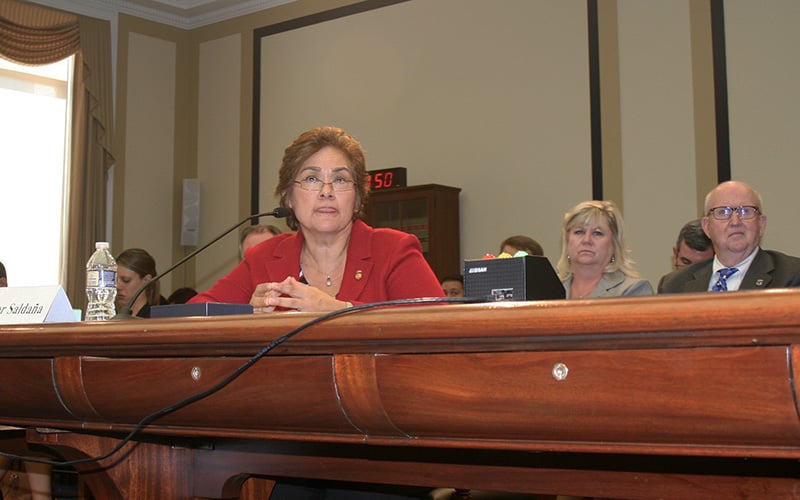
Immigration and Customs Enforcement Director Sarah Saldana told a House panel that detainee releases are often court-ordered, but that even then her agency makes public safety a priority. (Photo by Jessica Suerth/Cronkite News)
WASHINGTON – House members grilled the director of Immigration and Customs Enforcement Thursday, alleging that more than 80 percent of detainees released by the agency have criminal records and that some reoffend once they are freed.
ICE Director Sarah Saldana conceded in testimony to the House Judiciary Committee that 83 percent of freed detainees have prior criminal convictions. But many of them have to be released as a result of court actions, she said, and even then her agency works to make sure the public is secure.
“It (immigrant release) is not based on a feeling that someone is good or bad, it’s based on the file and the facts and circumstances,” Saldana said. “I will assure you, no one at Homeland Security or at ICE takes the release of someone with a criminal conviction more seriously than we do.”
Saldana said that two-thirds of releases are not within her control, but are the result of court rulings. Of the remaining one-third that ICE does have discretion to release, she said they are subjected to a two-tiered vetting process that involved both the local and federal levels.
Despite that review, Rep. Bob Goodlatte, R-Virginia, noted in his opening remarks that the agency has released “over 86,000 convicted criminal aliens over the last three years. These are not policies that protect Americans and help secure our borders.”
Goodlatte, the committee chairman, and other Republicans cited a February letter from Saldana that said 121 detainees who had been released between fiscal years 2010 and 2014 were later charged in a total of 135 homicides.
Rep. Trent Franks, R-Glendale, called the numbers “staggering,” even though the agency insisted they were “isolated examples.”
“You’re making an effort,” Franks said to Saldana. “But there’s still 130 people, Americans, who have died because we made the wrong decision there.”
Part of the problem, committee members said, is that many of the released detainees cannot be deported to their home countries, either because of instability in those countries or a refusal by the countries to readmit the immigrants.
The lawmakers said they want to see the agency and Homeland Security Secretary Jeh Johnson step up to countries that do not readmit deported immigrants and threaten to refuse visas to their citizens.
“I’m going to suggest to you that they don’t need to change their mind, we need to change our mind and say, ‘If you’re not going to take these back to you, we won’t offer you visas in the future,'” Franks said. “It’s a pretty simple equation.”
Rep. Sheila Jackson Lee, D-Texas, criticized the line of questioning by other committee members. She said lawmakers and ICE could “do better when we work together.”
“We are a nation of laws and a nation of immigrants,” Jackson Lee said. “It feels to me that the line of questioning on this panel seems to ignore that this nation was built on the hard work of immigrants and some who came not willingly.”
Saldana acknowledged that her agency is not perfect, but vowed to continue efforts to be 100 percent accurate when it comes to making decisions on detention and deportation of criminal immigrants.
“I fall on my sword where we have not used our best judgement and discretion,” she told the committee. “I wish we were 100 percent perfect in this regard.”